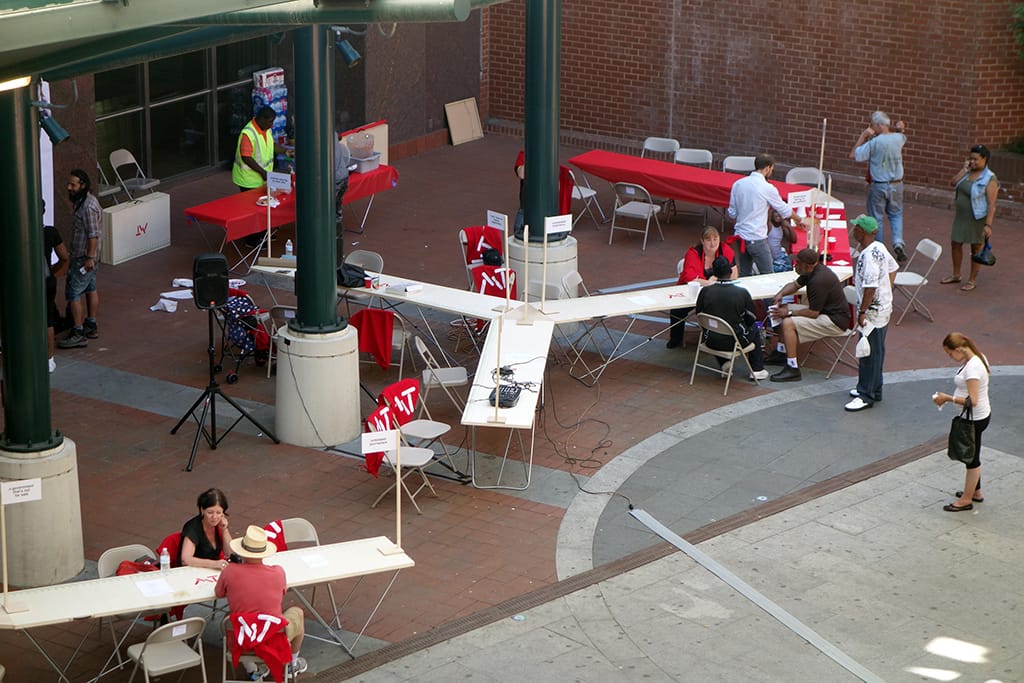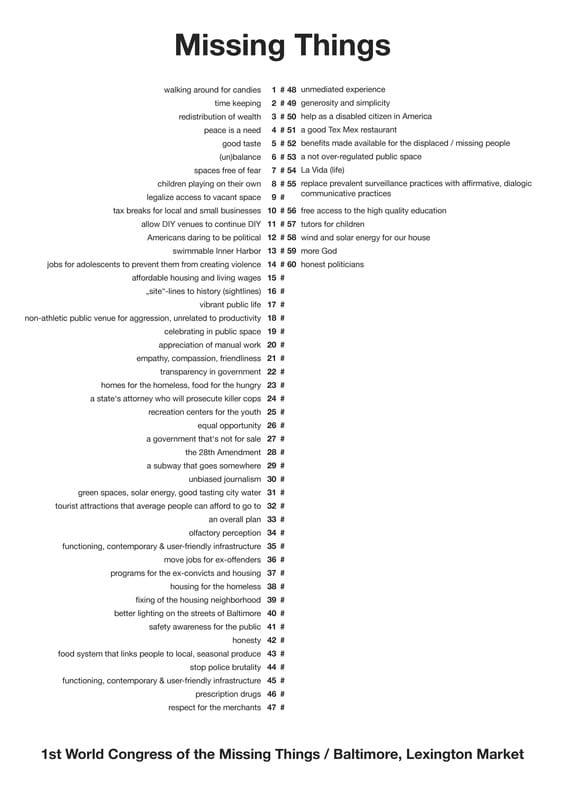|
The First World Congress of the Missing Things
The “First World Congress of the Missing Things” is an art project engaging in urban societal issues, which took place in the shrinking city of Baltimore in 2014. It introduced an artistic strategy for producing contents beyond obvious „missing things“ by shifting the expertise to the people who use the urban space in the downtown area around Lexington Market and Howard Street – the area of the „BROMO arts and entertainment district“. At the same time we communicated the call for submitting „missing things“ for the congress around the whole city in many events and established a congress office at Current Space on Howard Street. The ambitious endeavor of BOPA (Baltimore Office of Promotion and the Arts) addresses the question to which extent and by which means art and artistic strategies can have an impact on complex and large societal issues of urban development on a durational level. Art cannot resolve problems of this scale, but art can have an impact by positioning questions from a different perspective and engage people from backgrounds that usually do not have a voice – and bring together diverse participants and audiences. Baltimore has suffered from a long process of shrinking since the 1950s (from originally 1.000.000 inhabitants to currently 600.000) due to the post-industrial situation resulting in “white flight” from the city to the countryside. Currently there is hope that the once vibrant city center of Baltimore, which has undergone major decay, might be reanimated. The “First World Congress of the Missing Things” took place precisely in this contested area, shifting the usual concept of a congress from being an exclusive meeting of experts to an open-access event in public urban space. The current users of this public urban space ‒ homeless people, ex-convicts, drug addicts, shopkeepers, etc. ‒ were given back a public voice. They were invited to produce the contents of this unusual congress themselves and to claim expertise on these contents. This congress aimed at counteracting possible unwanted consequences of the anticipated revitalization, which often results in gentrification in US cities. A special non-hierarchical setting was conceived for the “First World Congress of the Missing Things”, which did not only accumulate “things” the people of Baltimore “missed”, but it also proposed ideas on how to involve locals in further processes and provide new perspectives for them in subsequent steps. The “Charter of the Missing Things” was handed over to mayor Stephanie Rawlings-Blake at the closing ceremony on June 8, 2014. Further information: www.missingthings.org |
A project by Barbara Holub (transparadiso, Vienna/ Austria) // initiated by Anton Falkeis (Social Design/ University of Applied Arts, Vienna) with the Austrian Cultural Forum/ Washington D.C., realized with Bromo Tower Arts & Entertainment, Inc. Dates: Rehearsal of the opening ceremony: Thu, June 5, 6:30 pm, meeting at Current Space Opening ceremony Sat, June 7, 9:30-10 am starting at Current Space and moving to Lexington Market: Congress Lexington Market/ MTA subway station June 7-8, 2014, 10 am - 5 pm Closing ceremony Lexington Market/ MTA subway station Sun, June 8, 5 pm with a performance by Simone Klien Handing over the "Charter of the Missing Things" to mayor Stephanie Rawlings-Blake Project team Vienna <> Baltimore Elisabeth Stephan, Marie-Christin Rissinger, Julian Verocai (students at Social Design/ University of Applied Arts, Vienna) Baltimore Priya Bhayana (director of Bromo Arts District) Nick Petr (alternative press center library, Baltimore), Michael Benevento (Current Space), Kate Ewald (video) Additional projects Marit Wolters, Lucia Hofer, Nika Kubyrova (students at TransArts/ University of Applied Arts Vienna// CI + concept for the opening ceremony), Simone Klien (performance at the closing ceremony) -------- “The First World Congress of the Missing Things” is part of TRANSIT, an initiative of the Washington, DC cluster of the European Union National Institutes for Culture and the Baltimore Office of Promotions & the Arts, and supported by a grant from the European Union. The European culture institutes involved are: Austrian Cultural Forum, British Council, Goethe-Institut and the Embassy of Spain. The project is also supported by a grant from ArtPlace America, a collaboration of leading national and regional foundations, banks and federal agencies accelerating creative placemaking across the US. Additional support for the Congress is provided by the Maryland Transit Administration. --------- Conference curated by the Goethe Institute, Washington D.C. May 30-31, 2014 „The role of artists and the arts for urban resilience“ ist Teil des Projekts Transit: Creative Placemaking in Baltimore und wird organisiert vom Goethe-Institut, dem Zusammenschluss der europäischen Kulturinstitute EUNIC in Washington DC und dem Baltimore Office of Promotion and the Arts (BOPA). www.goethe.de http://europeinbaltimore.org/transatlantic-symposium-the-role-of-the-artist-and-the-arts-in-urban-resilience/#prettyPhoto |

